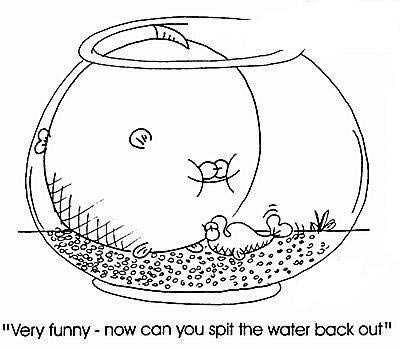曾幾何時(shí),我們所鐘愛的笑話簡單質(zhì)樸,不帶任何色彩,不針對任何人。這樣的笑話才能真正帶給我們精神上的愉悅。

By Alexander Chancellor
常布古 選注
One of my grandsons, when he was about seven, liked to tell a story about two cows in a field. One cow said “Moo,” to which the other irritably replied:[1] “Oh, I was just about to say that.” That is an example of the kind of innocent joke that one hardly ever hears nowadays. It is not “cutting edge”[2]. It does not “push at the boundaries[3]”. It is just pleasantly funny in a completely unchallenging kind of way.
Jokes of this kind were popular with my parents’ generation but are now rarely told by anyone except children. My father used to like one about two pigeons that had arranged to meet in Trafalgar Square[4]. One of them was late and, when asked what had happened, said: “It was such a lovely day that I thought I would walk.” And then there was his one about the frog saying when God created him: “Oh Lord, how you made me jump!”
My mother’s jokes were a little sharper, but still a great distance from the boundaries at which people nowadays are so keen[5] to push. She had one about a man who had gone for an audition[6] with a singing teacher. Given the thumbs-down, he turned sadly to the teacher and said: “Could I just ask you one thing? Am I a bass or a baritone?”[7] “No,” was the teacher’s simple reply.
Humour of the absurd, of which Lewis Carroll[8] was a master, deserves to have a comeback. Parody and satire, as practiced by Craig Brown and Private Eye, still contribute greatly to the gaiety of the nation, but too much of what passes for comedy on radio and television today is just vulgar and cruel.[9] And such “cutting-edge humour” is especially lowering in grim economic times.[10] What we now need to cheer us are kindly jokes with no targets or victims.
Here’s another one of my father’s (though perhaps not his funniest): two residents of a lunatic asylum are sitting in deckchairs by the sea when a passing seagull releases a dropping on to the bald head of one of them.[11] An attentive warder says he will run and get some lavatory paper.[12] “He must be as crazy as we are,” says the other lunatic. “By the time he gets back, the seagull will be miles away.”
Vocabulary
1. moo: 牛叫聲;irritably: 急躁地,易怒地。
2. cutting edge: 深刻的,敏銳的。
3. push at the boundaries: 指現(xiàn)在人們開玩笑有些“越界”,為追求效果不擇手段。
4. Trafalgar Square: 特拉法爾加廣場,位于倫敦市中心。
5. keen: 熱衷的,渴望的。
6. audition: 試音。
7. thumbs-down: 表示反對或拒絕的手勢;bass: 低音;baritone: 中音。
8. Lewis Carroll: 劉易斯?卡羅爾(1832—1898),英國兒童文學(xué)作家、數(shù)學(xué)家,主要作品有《愛麗絲漫游奇境記》、《鏡中世界》等。
9. parody:(對作家、藝術(shù)家風(fēng)格或流派的夸張滑稽的)模仿;satire:諷刺;Craig Brown: 英國知名諷刺作家,常年給Private Eye等報(bào)刊供稿,Private Eye是英國老牌雜志,專門諷刺揭發(fā)名人、政客等的各種丑聞;gaiety: 歡樂,愉快;pass for: 被看作,被當(dāng)作;vulgar: 庸俗的,低俗的。
10. lowering: 令人沮喪的;grim: 嚴(yán)峻的。
11. lunatic asylum: 精神病院,lunatic作名詞時(shí)意為“精神病患者”;deckchair:(海邊的)帆布躺椅;dropping: 糞便。
12. warder: 看門人;lavatory paper: 衛(wèi)生紙。
(來源:英語學(xué)習(xí)雜志)
